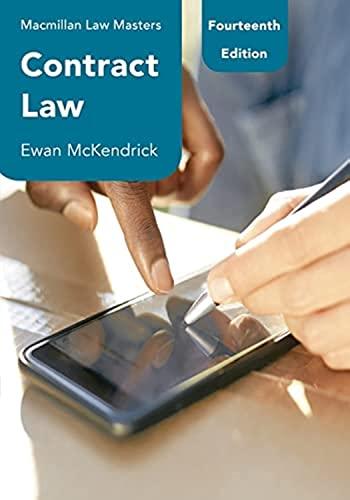Question
Legal precedent is the concept that once a law is applied in one way, that interpretation becomes law. We inherited this concept from the British
Legal precedent is the concept that once a law is applied in one way, that interpretation becomes law. We inherited this concept from the British common law system and is crucial to understanding the United States legal system. In the infamous Dred Scott Decision, the US Supreme Court determined that Mr. Scott was neither a person with constitutional rights nor could ever be given the full rights enjoyed by other Americans. Using examples, Justice Taney described this nation as governed by racial superiority on the basis of past precedent of laws and societal attitudes. The precedent set by the Scott Decision had to be overturned by three (3) Constitutional Amendments only possible through the secession of slave-holding states.
Excerpts from the Dred Scott Majority Opinion written by Chief Justice Taney:
"We think they [those of African descent] are not, and that they are not included, and were not intended to be included, under the word 'citizens' in the Constitution, and can therefore claim none of the rights and privileges which that instrument provides for and secures to citizens of the United States. On the contrary, they were at that time considered as a subordinate and inferior class of beings, who had been subjugated by the dominant race, and, whether emancipated or not, yet remained subject to their authority, and had no rights or privileges but such as those who held the power and the Government might choose to grant them."
" ...for more than a century before [those of African descent] been regarded as beings of an inferior order, and altogether unfit to associate with the white race, either in social or political relations; and so far inferior, that they had no rights which the white man was bound to respect; and that the negro might justly and lawfully be reduced to slavery for his benefit. He was bought and sold, and treated as an ordinary article of merchandise and traffic, whenever a profit could be made by it. This opinion was at that time fixed and universal in the civilized portion of the white race. It was regarded as an axiom in morals as well as in politics, which no one thought of disputing, or supposed to be open to dispute; and men in every grade and position in society daily and habitually acted upon it in their private pursuits, as well as in matters of public concern, without doubting for a moment the correctness of this opinion."
In your opinion, how much weight should a judgment from a prior case have on future cases? Is it a good thing to keep consistency or should it be easier to overturn bad precedent (with the understanding that good precedent could just as easily be overturned)? Are we to be held hostage to the past? How much of a "living document" should our constitution be?
Step by Step Solution
There are 3 Steps involved in it
Step: 1

Get Instant Access to Expert-Tailored Solutions
See step-by-step solutions with expert insights and AI powered tools for academic success
Step: 2

Step: 3

Ace Your Homework with AI
Get the answers you need in no time with our AI-driven, step-by-step assistance
Get Started


